Okay, book fans, here’s a little deal to help you start the year off right.
You can pick one from each of these three categories, and if you do, you will own a nice package of good reading — I recommend reading several at a time — and we’ll give you an extra deep discount.
Buy one from each of these three categories and we’ll offer a 30% discount.
The 30% off is good for four days only. This special Hearts & Minds New Year Package expires Tuesday night, January 5, 2016, at the stroke of midnight. The shoe will drop and that will be that.
Well, not really: you can buy any two of these, any time, at our special 20% off discount offered to our BookNotes subscribers, and on-line customers. Or buy just one for 10% off. How’s that for a fun sliding scale? Those offers usually don’t expire. But why not go for the package deal, and earn the better savings — 30% OFF! — and have a more balanced reading diet ready to go in the New Year?
Here I’ll list five good books in three important categories. Take your pick.
MEMOIRS
Everyone, I think, should read a memoir every so often. Engaging the same part of the brain that fiction does, a well-written story of an author’s life, or a narration of a part of his or her life, can be as engaging and enjoyable as a novel. I’ve read memoirs I so enjoyed that I’d slap my thigh and say I can hardly believe it, saying, once again, that you can’t make this stuff up! I think it is really useful to see how others narrate their lives, how people make sense of stuff, and it gives us greater abilities to be empathetic and understanding. Read memoirs!
Here are five that I loved this year, five great memoirs from 2015 that you should consider.
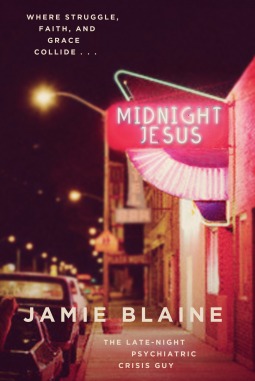 Midnight Jesus: The Late Night Psychiatric Crisis Guy Jamie Blaine (Nelson Books) $15.99 This was one of my favorite books of the year, with captivating writing so fresh and vibrant and exciting and funny and real. Blaine is a low-rent, ruffled, redneck Pentecostal with a ton of doubts and remarkable solidarity with other losers, crazies, drug-addicted, strippers, and religion-haunted characters. He’s most at home with the down-and-outers and the misfits. With extraordinary dignity and exceptional kindness he tells the stories of people he meets while working at a rehab and psych ward, befriending one and all. Midnight Jesus describes his journey as a psychology major in grad school, working at the clinic, helping out in his Pentecostal church’s blue-collar counseling ministry, all the while working as a DJ at the local roller rink. And keeping a running dialogue with Jesus who is, apparently, with him under the disco balls at the rink and in his rusted out pick up, driving late, late, at night. At least sometimes.
Midnight Jesus: The Late Night Psychiatric Crisis Guy Jamie Blaine (Nelson Books) $15.99 This was one of my favorite books of the year, with captivating writing so fresh and vibrant and exciting and funny and real. Blaine is a low-rent, ruffled, redneck Pentecostal with a ton of doubts and remarkable solidarity with other losers, crazies, drug-addicted, strippers, and religion-haunted characters. He’s most at home with the down-and-outers and the misfits. With extraordinary dignity and exceptional kindness he tells the stories of people he meets while working at a rehab and psych ward, befriending one and all. Midnight Jesus describes his journey as a psychology major in grad school, working at the clinic, helping out in his Pentecostal church’s blue-collar counseling ministry, all the while working as a DJ at the local roller rink. And keeping a running dialogue with Jesus who is, apparently, with him under the disco balls at the rink and in his rusted out pick up, driving late, late, at night. At least sometimes.
Blaine is Anne Lamott if she were Pentecostal, Southern, blue-collar, male, and, well, there’s that roller rink thing. Forget what I said about his similarities to lovely Anne: Jamie’s an original voice, with the occasional reference to Barth and Camus, but the more interesting ones from country and rock music or quotes Hunter S. Thompson; when he plays “The Old Rugged Cross” in a dive bar, or blasts heavy metal between his counseling sessions, it’s the real deal, raw and authentic and full of sheer wonder and grace. The chapter about how he connected with one schizoid client because he understood a punk song reference tattooed on a clients shoulder made me grin and grin. Yep, Blaine is right. God sure does show up in weird and mysterious ways.
And this memoir will remind you of that, in amazing prose and in, shall we say, unusual situations. It isn’t every Christian book where the author gets tossed in jail for making a public disturbance, and gets to play Clue in jail with a former client, himself a former church guy.
It also isn’t every Christian book — I’d say it isn’t any Christian book — that gets a rave endorsement by the likes of Augusten Burroughs, memoirist par excellence and author of Running With Scissors. Burroughs writes of Blaine’s Midnight Jesus that it is,
Gorgeous, brilliantly written, deeply moving, life-affirming, and just
plain stunning.
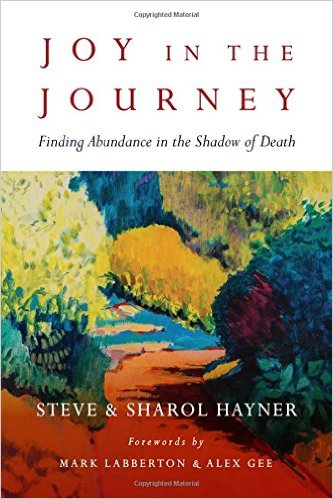 Joy in the Journey: Finding Abundance in the Shadow of Death Steve & Sharol Hayner (IVP) $16.00 I wrote about this at great length and have been told by more than one customer that it was the book that most moved them this past year. IOt is the story of the former IVCF leader who became the president of Columbia Seminary and found out he had pancreatic cancer. He and his wife, Sharol, entered into his last season of life — the physical pain, the cancer treatments, but more, the spiritual journey, the emotional connections with so many through the blog Steve wrote at the CaringBridge website — and tell about it, here. This book is mostly drawn from his moving diary kept during that last year as he chose how he would face death.
Joy in the Journey: Finding Abundance in the Shadow of Death Steve & Sharol Hayner (IVP) $16.00 I wrote about this at great length and have been told by more than one customer that it was the book that most moved them this past year. IOt is the story of the former IVCF leader who became the president of Columbia Seminary and found out he had pancreatic cancer. He and his wife, Sharol, entered into his last season of life — the physical pain, the cancer treatments, but more, the spiritual journey, the emotional connections with so many through the blog Steve wrote at the CaringBridge website — and tell about it, here. This book is mostly drawn from his moving diary kept during that last year as he chose how he would face death.
Steve was known for signing his letters “Joyfully” and this book illustrates the profound meaning of that practice and how it formed him into one with the the character and faith that could die well. It is a very, very moving book, and a great tribute to a thoughtful, joyful, Christian leader.
As Gary Haugen of IJM writes:
This is a rare gift, to be invited into a journal so utterly full and overflowing with both the depth of pain and loss and yet the anchor of hope.
This wonderful little book will be unforgettable, and was one of the best books of last year. It reads almost like a memoir since it is (mostly) a well-written set of diary entries designed to allow others to look into the story of his life, as well as that of his family and friends. Powerful.
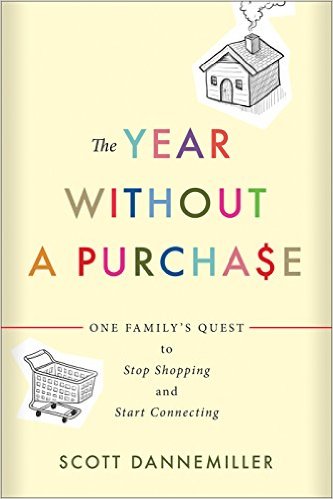 The Year WIthout A Purchase: One Family’s Quest to Stop Shopping and Start Connecting Scott Dannemiller (WJK) $16.00 I wrote this a few weeks ago, and I hope you saw it: This unassuming little volume is certainly one of my favorite books of the year — it made me laugh right out loud, made me cry and made me wonder what in the world they’d do next. And what in the world I might do next. It’s fun and really funny, as Dannemiller offers an insiders look into this family’s zany plan not to buy anything for a year (except food and essentials. And the stuff they might cheat on. Ha.)
The Year WIthout A Purchase: One Family’s Quest to Stop Shopping and Start Connecting Scott Dannemiller (WJK) $16.00 I wrote this a few weeks ago, and I hope you saw it: This unassuming little volume is certainly one of my favorite books of the year — it made me laugh right out loud, made me cry and made me wonder what in the world they’d do next. And what in the world I might do next. It’s fun and really funny, as Dannemiller offers an insiders look into this family’s zany plan not to buy anything for a year (except food and essentials. And the stuff they might cheat on. Ha.)
Margot Starbuck says it is “playful, thoughtful, substantial” and she is right. This family really did try to connect with others, living well on less, and it is told with a wink and a sly grin, even as it is nicely inviting and even compelling. Of course you don’t have to do what the Dannemiller’s — Scott, Gabby and two loud, smart kids — did, but it will inspire you to wonder about how you do your kids birthday parties, how you give gifts at holidays, how you do family vacations, and how you do or don’t fix or reuse stuff, what purchases you deem essential. Most of us are troubled by our own materialism, it seems, and most of us are aware of how the majority world lives in poverty. (The Dannemiller’s were Presbyterian missionaries for a year, doing social service in Central America, and lived in a poor, rural village.) This is a nice way to grapple more with being “rich Christians in an age of hunger” without being grumpy or anxious or overly political or guilt-induced. It’s a funny book, did I say that?
I love these kinds of reports from the front lines of a year-long experiment, memoirs of a slice of life as a family tries to accomplish something good. This one does just that, and I couldn’t put it down — I like reading about other families, about other dads, about other ordinary Christians trying to be more just, sustainable, joy-filled, and faithful. It would make a great book with which to kick off the year, even if you have no intention of doing anything like what Scott Dannemiller and his wife and kids did. Enjoy!
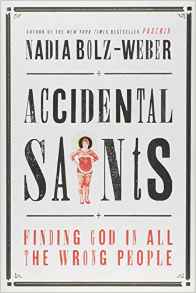 Accidental Saints: Finding God in All the Wrong People Nadia Bolz-Wevber (Convergent Books) $23.00 Nadia is one of a handful of poster children for the new face of emerging congregations, full of snarky cynicism, radical understandings of living in the way of Jesus, tattooed and cussing like the hip, stand-up comic she once was. This book is so well crafted it is a joy to read, the remarkable sentences, the powerful ways the essays weave together, the stories told about this or that person in her edgy Lutheran missional congregation, House of All Sinners and Saints. It is a memoir, yes, and a well written one, but, more, it is a window into deep faith and serious practices within a certain sort of liturgical, missional, post-Christiandom church and the story of a deep renewal of faith life amidst the un and de-churches.
Accidental Saints: Finding God in All the Wrong People Nadia Bolz-Wevber (Convergent Books) $23.00 Nadia is one of a handful of poster children for the new face of emerging congregations, full of snarky cynicism, radical understandings of living in the way of Jesus, tattooed and cussing like the hip, stand-up comic she once was. This book is so well crafted it is a joy to read, the remarkable sentences, the powerful ways the essays weave together, the stories told about this or that person in her edgy Lutheran missional congregation, House of All Sinners and Saints. It is a memoir, yes, and a well written one, but, more, it is a window into deep faith and serious practices within a certain sort of liturgical, missional, post-Christiandom church and the story of a deep renewal of faith life amidst the un and de-churches.
Sarah Miles, herself a stunning wordsmith and memoirist of great grace, says:
Nadia Bolz-Weber’s new book is even tougher, sharper, and sweeter than Pastrix. In painfully honest stories, she pulls back the curtains of religious life to show how church — the actual, living, Body of Christ — is created among us. This is a book for everyone who years to be made new.
Nadia has been called everything from a post-modern Augustine to a mash-up of “Louis C.K., Joey Ramone, and Saint Paul.” Think what you will at the end of her evangelical spirit and left-wing politics and unusual theology, this is a fabulous read, a fascinating bit of great writing, and a very moving story.
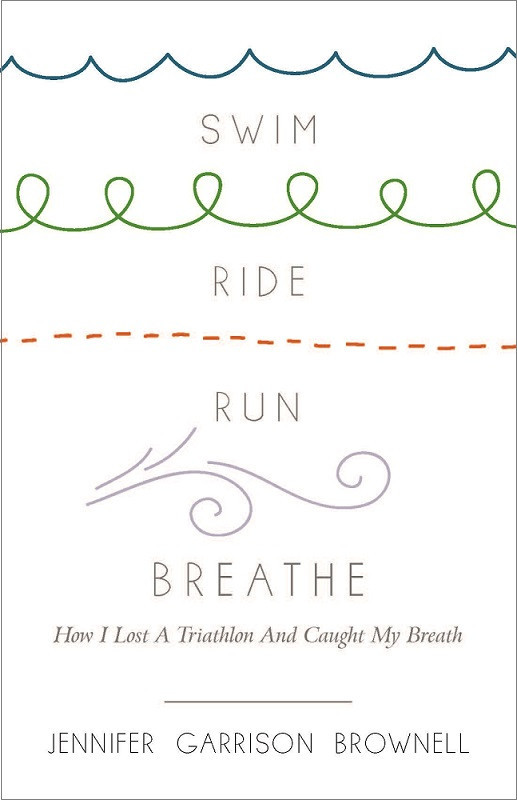 Swim, Ride, Run, Breathe: How I Lost a Triathlon and Caught My Breath Jennifer Garrison Brownell (Pilgrim Press) $18.00 What a fascinating, well written memoir, the nicely and honestly told story of a very un-athletic woman training for the tri. I was hooked on her clever writing from the very first page (I kid you not) and was drawn in to story of her bookish, mainline-Protestant expression of faith (she is a UCC pastor) and her nearly perplexing drive to do this big thing. In part, she wanted to learn to be more comfortable in her own body. A large part of the story — which is not the expected story of feeble person winning against all odds, hip, hip, hooray — is her honest telling of her good marriage with her husband, Jason, who is in a wheelchair. He has a form of muscular dystrophy so his own body issues loom large in her consciousness as well. As a mid-life, liberal Protestant pastor in Portlandia, as the wife of a sharp guy who is in a wheelchair, as a “dedicated non-athlete” she discovers quite a bit along the way.
Swim, Ride, Run, Breathe: How I Lost a Triathlon and Caught My Breath Jennifer Garrison Brownell (Pilgrim Press) $18.00 What a fascinating, well written memoir, the nicely and honestly told story of a very un-athletic woman training for the tri. I was hooked on her clever writing from the very first page (I kid you not) and was drawn in to story of her bookish, mainline-Protestant expression of faith (she is a UCC pastor) and her nearly perplexing drive to do this big thing. In part, she wanted to learn to be more comfortable in her own body. A large part of the story — which is not the expected story of feeble person winning against all odds, hip, hip, hooray — is her honest telling of her good marriage with her husband, Jason, who is in a wheelchair. He has a form of muscular dystrophy so his own body issues loom large in her consciousness as well. As a mid-life, liberal Protestant pastor in Portlandia, as the wife of a sharp guy who is in a wheelchair, as a “dedicated non-athlete” she discovers quite a bit along the way.
I was drawn to this because it was said it was written “with humor and without sentimentality.” Great wordsmith, writer, and preacher Debbie Blue (who wrote Consider the Birds) says of it,
This is no an inspiration tale about cheerfully conquering adversity. It is a funny, heartbreaking and wise story about telling the truth in all its messy beauty and learning to love it. It’s about finding grace and gratitude in the ordinary and extraordinary details of life and memory. It’s wonderful and hopeful. I loved it.
CHRISTIAN FORMATION/APPLIED THEOLOGY
Everyone should read, from time to time, books about basic Christian discipleship, living well, learning about faith and applying good theology to the rigors and routine of our daily lives. Here are five of my favorites this past year, good for nearly anyone who wants a thoughtful, helpful guide to deepening faith, maturing in characters, living more robustly for God’s Kingdom. These are each very well done and exceptionally valuable, useful to build us up and keep us going. Chose one of these and dig in, forming the habit of reading about daily discipleship and spiritual growth.
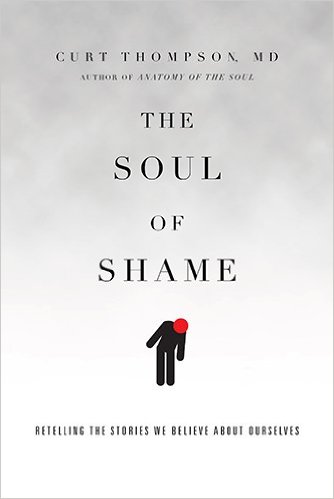 The Soul of Shame: Retelling the Stories We Believe About Our Selves Curt Thompson, MD (IVP) $22.00 This book by the energetic and thoughtful psychiatrist, Dr. Curt Thompson, is one of the best books of 2015, for sure. I reviewed it at great length, and Curt has gotten a lot of press and rave reviews from this, his second book. As I explained it is both a Biblically-based study of the toxic impact of shame, and a neuroscientists take of how it effects us, and what we can do about it. “We are all infected with the same spiritual disease” the back cover declares. “It’s name is shame.”
The Soul of Shame: Retelling the Stories We Believe About Our Selves Curt Thompson, MD (IVP) $22.00 This book by the energetic and thoughtful psychiatrist, Dr. Curt Thompson, is one of the best books of 2015, for sure. I reviewed it at great length, and Curt has gotten a lot of press and rave reviews from this, his second book. As I explained it is both a Biblically-based study of the toxic impact of shame, and a neuroscientists take of how it effects us, and what we can do about it. “We are all infected with the same spiritual disease” the back cover declares. “It’s name is shame.”
This book is a great example of evangelical faith related to science and brain studies, and it is a great example of a book informed by pretty serious theology and science can be so very useful, practical for those who are hurting and a good guide for nearly anyone wanting to live more fully, understand sin and grace, dysfunction and being set free, our brokenness and the hope of restoration. The book reminds us of embracing the big picture of the Scriptures and how developing a deeply Christian worldview and living out of that story is a aid for developing a coherent, sustainable life.
The lively and good writer Dan Allender says it is “a magisterial work — thoughtful, compelling, and transformative.”
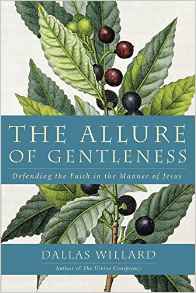 The Allure of Gentleness: Defending the Faith in the Manner of Jesus Dallas Willard (HarperOne) $26.99 I hope you know the late, great, Dallas Willard, and his rich, thoughtful books that are deep and penetrating, without being obscure or scholarly. He was a philosophy professor and a spiritual director schooled in the deepest classics. He was brilliant and yet humble, a writer about the ways the Kingdom of Christ break into our lives, often from the inside out. He was an excellent thinker with a practical bent, the best sort of guide and coach. His wrote a good handful of books about spiritual transformation.
The Allure of Gentleness: Defending the Faith in the Manner of Jesus Dallas Willard (HarperOne) $26.99 I hope you know the late, great, Dallas Willard, and his rich, thoughtful books that are deep and penetrating, without being obscure or scholarly. He was a philosophy professor and a spiritual director schooled in the deepest classics. He was brilliant and yet humble, a writer about the ways the Kingdom of Christ break into our lives, often from the inside out. He was an excellent thinker with a practical bent, the best sort of guide and coach. His wrote a good handful of books about spiritual transformation.
This book was about how we can talk about the faith, present it to others, do what is usually called apologetics and evangelism, without the arguing, the brow-beating, the logical gymnastics.
Presbyterian pastor and Bible scholar Eugene Peterson writes:
I grew up in a Christian culture in which ‘defending the faith’ was carried out by using the Bible as a weapon. Anyone who challenged my faith was treated as an enemy. As an adult I discovered Dallas Willard. Unfailingly gentle and respectful, he transformed the apologetics of my generation as many of us ‘laid down our swords and shields.’
I am sure you got that reference in the Peterson quote to “Down by the Riverside.” Yes, we will “lay down our swords and shields” but that doesn’t mean we are not in a battle, even a battle for hearts and minds. But we fight in a very different way, so different that fighting hardly even seems the apt word. Defending the faith is hardly the right way to say it. What is a better image, and what are better practices, for bearing witness in ways that are kind and fruitful? Full of grace and truth? Willard can help.
As J.P. Moreland says, “I have never seen a book remotely like this.” He continues,
Because Willard places apologetics against the backdrop of pastoral care, it makes it a practice everyone who loves people should master. This is essential reading.
J. Stanley Mattson, founder and director of the C.S. Lewis Foundation says Willard is like Lewis. “Willard advocates for truth, born on the wings of grace, and does so in the manner of a fellow pilgrim, keen to listen and to share.”
Chris Hall, director of academic spiritual formation at Eastern University, says of it,
Classic Willard: the gifted Christian philosopher answering hard questions — the questions so many people have about God, hell, the problem of evil, the nature of freedom, the wonder of Jesus — in an accessible style and with a gentle spirit.
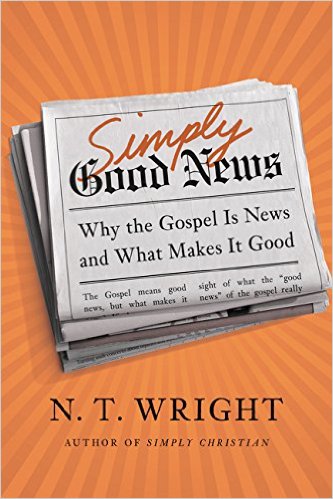 Simply Good News: Why the Gospel is News and What Makes it Good N.T. Wright (HarperOne) $24.99 You most likely know that we are huge fans of Tom Wright, and admire his intellectual rigor, his broad involvement with various schools of thought and his cordial friendships with scholars from all over the map, so to speak. We believe he is, when properly understood, a wonderful example of being forward-thinking and relevant, certainly, but faithful and solid to historic Biblical insights and theological verities. Why not start off the hear either dipping in to Wright in an introductory way, or recalling many of his oft-spoken views.
Simply Good News: Why the Gospel is News and What Makes it Good N.T. Wright (HarperOne) $24.99 You most likely know that we are huge fans of Tom Wright, and admire his intellectual rigor, his broad involvement with various schools of thought and his cordial friendships with scholars from all over the map, so to speak. We believe he is, when properly understood, a wonderful example of being forward-thinking and relevant, certainly, but faithful and solid to historic Biblical insights and theological verities. Why not start off the hear either dipping in to Wright in an introductory way, or recalling many of his oft-spoken views.
This book is nearly a “greatest hits” album, a wonderful way to be brought up to speed with a variety of his most important themes. There is a strong teaching here about the reliability of the gospel accounts, the importance of Jesus in the flow of the whole Scriptures, and how Christ is the King of all of life, inaugurating the start of God’s redemptive project of new creation. Wright is prolific and energetic and has some relatively easy to read books (wonderful collections of sermons and essays) and super-detailed scholarly work. This one is what we might call “mid-level” — an example of his informed vision and serious scholarship, but happily written, very, very accessible. Nice.
Here’s an offer: we can substitute this one for almost any other N.T. Wright volume, big or small. We’ve got ’em all. Read some Wright in the New Year!
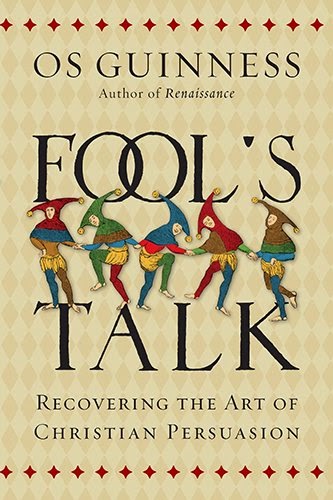 Fools Talk: Recovering the Art of Christian Persuasion Os Guinness (IVP) $22.00 Again, this is doubtlessly one of the best books of 2015 and will certainly be on any list I do to celebrate the year’s best releases. I hope you saw my own long BookNotes review to it and my appreciation for the many volumes of the astute Dr. Guinness. I’m a fan of his exceptionally thoughtful work, and, as with most great authors, he is sure to stimulate your thinking, stir your heart, and make you wonder if you agree with his thesis or not.
Fools Talk: Recovering the Art of Christian Persuasion Os Guinness (IVP) $22.00 Again, this is doubtlessly one of the best books of 2015 and will certainly be on any list I do to celebrate the year’s best releases. I hope you saw my own long BookNotes review to it and my appreciation for the many volumes of the astute Dr. Guinness. I’m a fan of his exceptionally thoughtful work, and, as with most great authors, he is sure to stimulate your thinking, stir your heart, and make you wonder if you agree with his thesis or not.
This is, in some ways, an outpouring of a lifetime of hard thinking on the part of Guinness, informed, too, by a lifetime of serious conversations with seekers, cynics, atheists and various sorts of believers. He has gleaned what he has learned from the likes of C.S. Lewis, Francis Schaeffer, and sociologist Peter Berger about how to make a plausible case for those who are disposed to disbelief the truths of the gospel.
There are a good number of reviewers and people to whom we’ve sold this book this year who believe this is one of the best books they’ve ever read, and it surely should be considered an exceptionally valuable work, instructing us about how to talk well with those in the modern world. Os shows us why simple formulaic testimonies or tit-for-tat rebuttals of questions offered by those who question the faith are often not adequate if we want others to seriously consider the claims of Christ. We have to get beyond typical evangelism or typical apologetics.
Ravi Zacharias says it is a “must read” and Tim Keller says “I highly recommend it.” Dr. Guinness discusses the dynamics of how conversation, real communication, and persuasion works, including the use of satire (and story) to help people see deeper truths. Do we want the gospel to seem plausible and attractive to post-Christian modernists? Do we want to actually make good headway in persuading others, no merely having fruitless arguments? Holy Fools is a very stimulating, serious, profound book and it is well worth working through. Highly recommended.
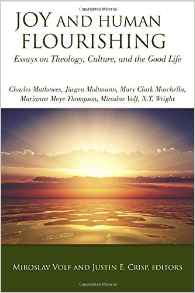 Joy and Human Flourishing: Essays on Theology, Culture and the Good Life edited by Miroslav Volf and Justin E. Crisp (Fortress) $39.00 What a book, a serious-minded, thoughtfully-prepared, applicable study of joy and its repercussions in the church and the world! Joy is a primary call, these authors tell us, and a central reality of life lived in God. Surely we need more serious Biblical and theological study of this pleasant, but perplexing, topic. Such a study dare not be glib or disinterested in the complex hardships of our fallen world. It would have to explore joy in our own lives, show how our own spiritual formation practices might help, and how that might allow us to live better in the world, in the culture, such as it is, with more care and compassion. Joy and Human Flourishing is just such a book. It includes pieces from Jurgen Moltmann, N.T. Wright, Marianne Meye Thompson, Mary Clark Mochella, Charles Mathewes, and, of course, Volf. These are agents of shalom and this offers what John Ortberg calls “a grand project on a vast and vibrant scale.”
Joy and Human Flourishing: Essays on Theology, Culture and the Good Life edited by Miroslav Volf and Justin E. Crisp (Fortress) $39.00 What a book, a serious-minded, thoughtfully-prepared, applicable study of joy and its repercussions in the church and the world! Joy is a primary call, these authors tell us, and a central reality of life lived in God. Surely we need more serious Biblical and theological study of this pleasant, but perplexing, topic. Such a study dare not be glib or disinterested in the complex hardships of our fallen world. It would have to explore joy in our own lives, show how our own spiritual formation practices might help, and how that might allow us to live better in the world, in the culture, such as it is, with more care and compassion. Joy and Human Flourishing is just such a book. It includes pieces from Jurgen Moltmann, N.T. Wright, Marianne Meye Thompson, Mary Clark Mochella, Charles Mathewes, and, of course, Volf. These are agents of shalom and this offers what John Ortberg calls “a grand project on a vast and vibrant scale.”
Indeed, Nicholas Wolterstorff says:
If ever a book filled a gap, this is it. Joy is a central component in the New Testament description of life as it is meant to be lived… This volume is an excellent beginning at filling that gap. It is ground breaking.
SOCIAL CONCERN, PUBLIC LIFE, MISSIONAL SERVICE IN THE WORLD
This has been a rich year for good books about public justice, the relationship of personal spirituality to cultural renewal, about how the gospel transforms lives, and also calls us to work for systemic change and social renewal as agents of God’s shalom. I write a lot about such themes — Christian ministry in the arts, about racial justice, about political theology, work, and the like. Why not balance your faith with this kind of inspiring call to outward service? Here are five recent ones, among the best of this past year that will expand your horizons a bit.
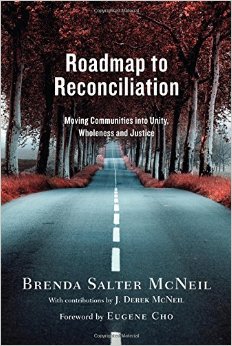 Roadmap to Reconciliation: Moving Communities into Unity, Wholeness, and Justice Brenda Salter McNeil (IVP) $16.00 This new hardback is a great, great little book and gives a fabulous overview of the Biblical basis for racial reconciliation and pushes us towards true and lasting answers. We can see the inequality, we understand the problems, but are we ready to rise up in faithful action? What steps should we take to offer gospel-centered, wholistic, spiritual answers for racial justice?
Roadmap to Reconciliation: Moving Communities into Unity, Wholeness, and Justice Brenda Salter McNeil (IVP) $16.00 This new hardback is a great, great little book and gives a fabulous overview of the Biblical basis for racial reconciliation and pushes us towards true and lasting answers. We can see the inequality, we understand the problems, but are we ready to rise up in faithful action? What steps should we take to offer gospel-centered, wholistic, spiritual answers for racial justice?
This new book claims to be nothing short of a roadmap to show us the way. I’ve appreciated Brenda’s several other books and love her powerful, faithful public speaking. Shane Claiborne says she is “a legend… one of the church’s greatest thinkers on one of the world’s greatest challenges.”
Here are what some others say about this:
Soong-Chan Rah says it “offers helpful categories to sharpen our discussions and useful exercises that are both practical and applicable.” Christena Cleveland says it is “a practical handbook for small groups.” Patricia Raybon says it “shows believers how to stop talking about reconciliation and start being it together. Gripping to read and exciting to receive, passionate, equipping, and downright brilliant.” Brenda walks the walk as they say, and this brand new book is getting lots of attention. Add it to your list.
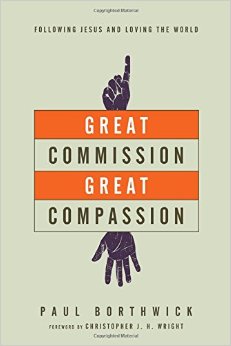 Great Commission Great Compassion: Following Jesus and Loving the World Paul Borthwick (IVP) $16.00 I love the slogan that is on the back cover of this new book: “We follow Jesus into all the world, and we follow his example in all we do.” Right — we do His work in His way, called to whole-life discipleship, serving others in faithful ways.
Great Commission Great Compassion: Following Jesus and Loving the World Paul Borthwick (IVP) $16.00 I love the slogan that is on the back cover of this new book: “We follow Jesus into all the world, and we follow his example in all we do.” Right — we do His work in His way, called to whole-life discipleship, serving others in faithful ways.
Borthwick is one of the best writers to do exciting and compelling introductions to why we should care about world missions. He has deepened and perhaps widened his vision in recent years, writing more generally about our missional call to follow Christ in ways that allow us to make a difference, wherever we are. His great strength is helping us not only know what we should about this complex topic but finding on-ramps and next steps for further involvement.
As Greg Jao has explained, “Great Commission, Great Compassion, distills a week-long missions conference into a form that you can read, savor, and apply anywhere, anytime.” Do you want the Great Commission to be more deeply understood in your circles? Do you want to be more committed to wholistic service, linking evangelism and compassion? Do you want to hear God’s own heartbeat, becoming more in tune with Christ’s own biggest hopes? This book will help, I promise.
One of the great Bible scholars of our day, Chris Wright, wrote a lovely and inspiring foreword, noting that we need “the whole Bible story for our understanding and practice of mission.” What should we do? Christopher Wright says to give them Borthwick’s new book which helps us take steps towards “holistic, integrated mission that includes word and deed, evangelism, creation care and all the rest…” The 100 suggestions that are in a closing appendix are themselves well worth considering. Yes!
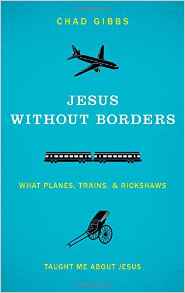 Jesus Without Borders: What Plains, Trains and Rickshaws Taught Me About Jesus Chad Gibbs (Zondervan) $15.99 I could list this as a memoir as it is nearly a straight travelogue, a delightful journey nicely told, exuberant and funny at times, about a guy traveling around the world. But I list it here: Gibbs doesn’t just want to offer a literary memoir of his journey, but he wants us to understand a clearer picture of how other Christians all over the world worship, and what we can learn from their practices and lifestyles. It isn’t exactly about world missions and it isn’t exactly about global justice and it isn’t directly about multi-culturalism. He has more than a dozen chapters, writing about what he learned in places as diverse as Russia and Brazil, Japan and India, The Netherlands and Uganda and, well, it really can help us all be more globally aware as world citizens, and more, as a multi-ethnic and multi-national Body of Christ.
Jesus Without Borders: What Plains, Trains and Rickshaws Taught Me About Jesus Chad Gibbs (Zondervan) $15.99 I could list this as a memoir as it is nearly a straight travelogue, a delightful journey nicely told, exuberant and funny at times, about a guy traveling around the world. But I list it here: Gibbs doesn’t just want to offer a literary memoir of his journey, but he wants us to understand a clearer picture of how other Christians all over the world worship, and what we can learn from their practices and lifestyles. It isn’t exactly about world missions and it isn’t exactly about global justice and it isn’t directly about multi-culturalism. He has more than a dozen chapters, writing about what he learned in places as diverse as Russia and Brazil, Japan and India, The Netherlands and Uganda and, well, it really can help us all be more globally aware as world citizens, and more, as a multi-ethnic and multi-national Body of Christ.
Can other people’s cultures teach us? Well, of course. Can we be formed in new ways and deepen the fidelity of our own discipleship by paying attention to our brothers and sisters elsewhere? Indeed. Can it be a fun learning experience, an enjoyable ride, even if a bit out of our comfort zone? Oh yes it can! Ghad Gibbs is living proof and Jesus Without Borders is a great example of how we can be drawn to God though a good story. Delightful.
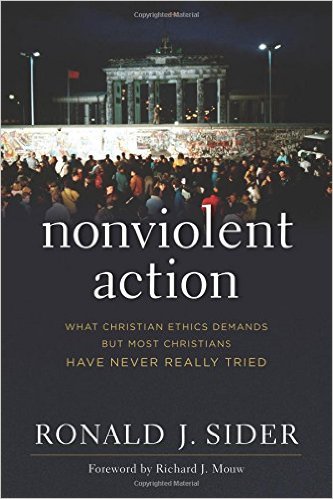 Nonviolent Action: What Christian Ethics Demands But Most Christians Have Never Really Tried Ronald J. Sider (Brazos Press) $19.99 I wrote about this when it first came out last winter, and now, at years end, wish to tell you again about how very inspiring this is, and how very sensible it seems to me — if risky, courageous, demanding. I would be so very happy if some of our faithful customers took it up in their reading plan this new year. It would make a great study or book club title to talk about.
Nonviolent Action: What Christian Ethics Demands But Most Christians Have Never Really Tried Ronald J. Sider (Brazos Press) $19.99 I wrote about this when it first came out last winter, and now, at years end, wish to tell you again about how very inspiring this is, and how very sensible it seems to me — if risky, courageous, demanding. I would be so very happy if some of our faithful customers took it up in their reading plan this new year. It would make a great study or book club title to talk about.
I suppose you know that Sider is a Brethren Christian, a conservative evangelical that takes the BIble rather literally on the question of nonviolence. That is, he thinks that war is a sin and, like other sins — drunkenness, sexual immorality, racism, what have you — Christians are called to refrain from involvement. It is so very odd to hear Christians who hold to a conservative political agenda complain about how the progressives and liberals (as they call them) just want to be like the world or are PC like the culture when, in this case, at least, nothing could be further from the truth: Sider is counter-cultural, not caring what “the world” thinks and his Biblical literalism on questions of nonviolence is disregarded by both the culture and the church. As a rural farm boy growing up a gospel-cased, Bible-believing, evangelical, being worldly or seeking approval of those in the culture was certainly not important to him, and this book certainly illustrates that. Taking the Bible and Christian ethics seriously on this issue certainly doesn’t sound like anybody in the culture! Consequently, Dr. Sider regularly calls us to follow Jesus, to reject the worldliness of fighting, and invites us to the upside down values of Jesus, like putting away the sword and turning the other check and overcoming evil with good. So, he’s a consistently pro-life Christian pacifist.
But here is the thing: Sider is also aware that most Christians disagree with him on this, and that most Christians believe in the sad necessity of the use of some violence in some situations. But in a world where preachers extol violence and we routinely fail to obey Christ’s simple teaching about praying for our enemies, and where guns and flags are displayed even in Christian sanctuaries, he knows that the call to nonviolence isn’t common and certainly not seriously considered by many. He has written about that in other books, but doesn’t much in this one. In this book, however, he is offering a bit of a compromise, a fair and honest suggestion to those who don’t embrace Biblical nonviolence.
You see, most Christian people believe in what is called the “just war theory.” That means, to put it simply, that some wars are sometimes necessary and it is ethically legitimate for Christians to fight in such wars. The tradition has many permutations and varying theologians emphasize different aspects of this school of thought, buy almost all agree that any Christian involvement in warfare has to be limited — we can’t fight in immoral wars and we can’t intend to kill civilians, for instance. One of the principles of the just war theory is that for a war to be just and acceptable, it must be a last ditch effort. It is a sad last resort when every other reasonable option to be a peacemaker has failed.
Therefore, says Ron Sider in this fabulously interesting and stimulating recent book, we must, at least, try non-lethal ways of stopping war before we agree to be complicit in worldly violence. Every major scholar and spokesperson of the just war theory down through church history has more or less said this; it is one of the principles embraced by Catholics, Orthodox, and mainline Protestants: we can’t be overly zealous in going to war, and it must only be endorsed if it is the last ditch effort. So, in this book Sider shows how nonviolent options might be first considered as an alternative to war, and offeres strategies we could propose before agreeing to wage violence. There are great examples where this has happened and some of them are really dramatic!
From all throughout history there have been breath-taking examples of warriors turned back and oppressors resisted by ways other than by killing them. Nonviolent Action: What Christian Ethics Demands… proposes that it isn’t sensible or ethically legitimate to endorse wars and bless the bombs unless we’ve tried some of these other plausible strategies first. I think he is correct.
Nonviolent action and non-lethal resistance has been practiced in history and in other social-political situations to promote peace and oppose injustice although many of us haven’t heard most of these remarkable episodes of creative peacemaking. This is actually an incredibly hopeful book, helping us see that even in this dangerous, awful world of ISIS and the like, God can use God’s own upside methods to shame the powerful and liberate the oppressed and restore the order of common good. Sider has done a great service in compiling these stories, and putting them together for us in one inspiring volume.
The foreword to this stimulating, provocative book is by Presbyterian Richard Mouw. Mouw, you should know, is not a pacifist, so he disagrees with Sider about whether Bible-informed Christians should kill. Sider says no, of course, but Mouw would reluctantly allow such tragic necessity. But Mouw, in his very compelling introduction, mostly agrees with Ron’s thesis here: those that hold to the just war theory should admit that we dare not head off into war without trying other methods of conflict resolution and nonviolent resistance first. This will take energy, creativity, research, prayerful discernment, and the willingness to suffer, perhaps, in order to be faithful to the limits and constraints of the just war theory. If we haven’t tried some of this stuff, Sider and Mouw maintain, we can’t in good conscious say war and killing is a last resort.
This collection of amazing stories will blow you away. They will inspire you, stimulate your imagination to suppose new ideas and think differently about what it possible. It might change your view of modern warfare or the call to peacemaking. Regardless of how plausible and effective some of these examples of the past might be today, we must at least be aware and try them or something like them, if we are going to be true to the standard ethical viewpoints down through church history: war and bombing and killing must be a last resort. We can’t just do “whatever it takes” as we must be faithful to ethical guidelines and Biblical principles. Other options must be considered and tried. This book shows us how.
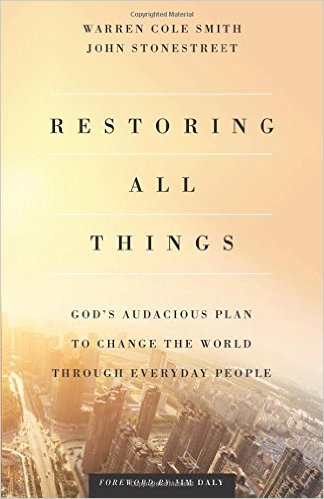 Restoring All Things: God’s Audacious Plan to Change the World Through Everyday People Warren Cole Smith & John Stonestreet (Baker Books) $16.99 This is another good book I’ve previously announced, a notable one in 2015. I loved much of this, and it has some great strengths: it combines a Biblically big vision of what God is doing in our world — bringing Christ’s Kingdom to bear in all of life, followers of Jesus becoming salt and light in the world but not of it. Yes, it sees that God is bringing grace and hope to all, in various ways, in all manner of spheres and places. So I likes it’s wholistic vision, and it is a good way into this evangelical truth that God is at work in the world and we are invited to join in.
Restoring All Things: God’s Audacious Plan to Change the World Through Everyday People Warren Cole Smith & John Stonestreet (Baker Books) $16.99 This is another good book I’ve previously announced, a notable one in 2015. I loved much of this, and it has some great strengths: it combines a Biblically big vision of what God is doing in our world — bringing Christ’s Kingdom to bear in all of life, followers of Jesus becoming salt and light in the world but not of it. Yes, it sees that God is bringing grace and hope to all, in various ways, in all manner of spheres and places. So I likes it’s wholistic vision, and it is a good way into this evangelical truth that God is at work in the world and we are invited to join in.
Secondly, this book is strong and will be very appealing to many because it is mostly stories, examples to inspire us of remarkable things going on in educational ministries, in medical reform, in political life, among the poor, victims of trafficking, in the media, in science. Smith & Stonestreet’s Restoring All Things is a veritable case study of the shifts in evangelical thinking and mission in the last generation, showing that solid, faithful Christian folks are getting involved in social reform and cultural renewal, without forfeiting the the first things of the gospel or the imperatives of a Biblically-based form of faith. Many have embraced “God’s audacious plan!”
As Jay Richards says this is “not just encouragement but a good swift kick in the pants.” If you are discouraged or taken with “doom and gloom” these real life examples of mercy and love, justice and peace, love and forgiveness on display by ordinary folks caught up with this vision of God’s restoring work in all of life will help you resist despair and take up a sober hope. Maybe you’ll be inspired to do some of these sorts of initiatives. A great resource and a great way to kick off your new reading year!
Here is a reminder of our offer, the plans for a balanced book reading package.
Buying one from each category is recommended but not required.
BUY 3 BOOKS — get 30% OFF
BUY 2 BOOKS — get 20% OFF
BUY 1 BOOK — get 10% OFF
BookNotes
DISCOUNT
ANY ITEM MENTIONED
(30% off promotion expires January 5, 2016)
order here
takes you to the secure Hearts & Minds order form page
just tell us what you want
inquire here
if you have questions or need more information
just ask us what you want to know
Hearts & Minds 234 East Main Street Dallastown, PA 17313 717-246-3333
